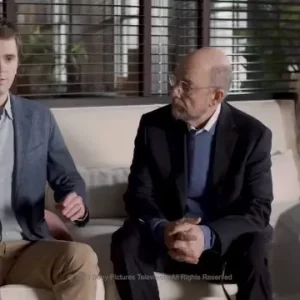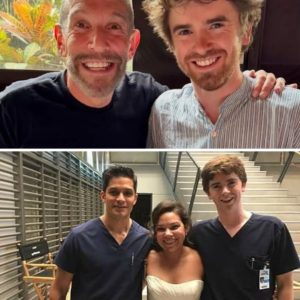When Noah Galvin stepped into the role of Dr. Asher Wolke on The Good Doctor, few could have predicted the profound impact his character would have on both the show and its audience. Originally introduced as a former Orthodox Jew who left his community after coming out as gay, Asher was not your typical medical drama character. He was raw, complex, and refreshingly real. Now, several seasons in, Noah Galvin is reflecting on the journey of Dr. Wolke — and why it resonates far beyond the screen.
From Controversy to Complexity
Dr. Asher Wolke wasn’t meant to be easy to understand. He carried with him the scars of a complicated past: growing up in a deeply religious community, being rejected for his sexuality, and wrestling with his identity while trying to redefine his future as a surgeon. These elements made him an immediate source of interest — and also, for some, controversy.
But Noah Galvin never intended for Asher to be simplified. “It’s not just about being gay,” he explained. “It’s about being human. It’s about the messiness of figuring out who you are and how you want to live.”
That depth is what quickly won fans over. Asher wasn’t a caricature or a token character. He was written — and played — as someone navigating pain, faith, love, and purpose with honesty and resilience.

Healing Through Humor
One of the most unexpected elements of Asher’s character is his wit. Amidst the life-and-death seriousness of the operating room, he often delivers the levity that keeps the show grounded.
“Noah Galvin brings this beautiful blend of sarcasm and sincerity to Asher,” said a Good Doctor writer in an interview. “It’s not about comic relief — it’s about how people survive tough situations. And Asher uses humor as a tool to process, to connect, and sometimes to protect himself.”
Galvin agrees. “Asher is funny, but it’s not performative. It’s part of his defense mechanism, sure, but it’s also how he finds joy in a world that hasn’t always been kind to him.”
That humor has helped make him one of the most beloved characters in the series. Fans appreciate the balance between his biting one-liners and his emotional vulnerability. It’s a duality that makes Asher feel human — and deeply relatable.
Messages That Matter
Perhaps the most touching aspect of Dr. Asher Wolke’s story is how it’s impacted real people. Noah Galvin regularly receives messages from viewers who see themselves in Asher — people who’ve struggled to come out, who’ve been rejected by their families or religious communities, or who are still navigating the tension between faith and identity.
“People message me saying Asher helped them come out or reconcile their faith with their identity,” Galvin shared. “That’s more powerful than any script.”
One particularly moving message came from a young man who had been closeted in a religious household. After watching Asher on The Good Doctor, he found the courage to come out to his parents. “It’s stories like that,” Galvin said, “that make everything worth it.”
Representation, when done right, can be life-changing — even life-saving. And Dr. Asher is proof of that.

Evolving On and Off the Screen
Asher’s journey continues to evolve in recent seasons. Viewers have seen him fall in love, make mistakes, challenge authority, and grow into a more confident version of himself. His arc isn’t linear — and that’s the point.
Galvin appreciates that the writers allow Asher to be messy and real. “He’s allowed to screw up. He’s allowed to be defensive, or jealous, or insecure — just like anyone else,” he said. “That’s how you know a character is being treated with respect.”
Behind the scenes, Galvin has also grown more connected to his character. “At first, I saw Asher as someone I had to research and reach for,” he noted. “Now, I feel like we’re meeting in the middle. There’s more of me in him, and maybe a little bit of him in me.” As The Good Doctor moves forward, Noah Galvin hopes that Asher’s storyline continues to explore new dimensions. There are still so many layers to unpack — about identity, family, community, and love. But more than anything, Galvin wants Asher to keep challenging expectations. “I don’t want him to be safe,” he said. “I want him to be bold. I want him to ask the hard questions. I want him to grow — and maybe even stumble along the way. Because that’s what real people do.”





